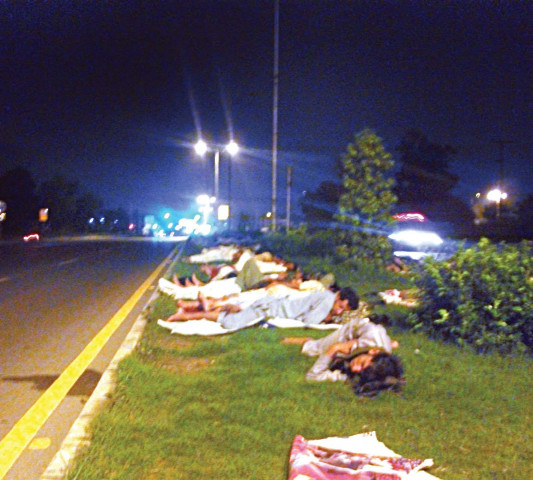Life by the roadside
Life for the shelterless wage labourers of the capital is anything but a fairytale.

Come night, hundreds of such labourers flock to a grassy median on the 9th Avenue, in front of Peshawar Mor. This is where they sleep, sandwiched between two streams of traffic, on the green divide between the roads.
“We fight insects and humidity on this green patch of land throughout the night. But we cannot get anything better than this,” said 50-year-old Muhammad Ashraf, a daily wage labourer from Attock.
Before, they used to sleep in the verandas in front of shops in Peshawar Mor market, but the secret agencies forced them away citing security reasons. And so the grassy road divider on 9th Avenue became their new home.
“It rains almost every night these days and we have to rush to verandas in the market,” said Ashraf. “When it does not rain, humidity and insects become almost unbearable,” he added.
Ashraf has been working as a labourer in Islamabad for the past 14 years. Having witnessed the ups and downs of labour work in the capital, he said, “It has really been tough to find work under the present government. During the previous governments there were more labour opportunities but these are the worst of times,” he claimed.
Most of them earn Rs6000 to Rs8000 a month. The fraternity includes people from all over the country including some emigrants from Afghanistan.
For a day’s work, a mason gets Rs600 daily, whereas labourers earn around Rs300.
These workers often stay away from their families for months. “We face starvation and cannot go back to our homes. Still it is becoming increasingly difficult for us to make ends meet in the meagre sum that we earn,” said Muhammad Javed, another labourer from Swabi district.
“Five days earlier, I earned Rs1000 for lifting 2000 bricks at a construction site. Today, I have nothing in my pockets. We are only able to send Rs4000-5000 per month back to our families,” Javed said.
While these labourers seem to have made peace with their fate, they still sometimes complain about the money that they get compared to the efforts that they put in.
“Today my five-year-old daughter called and asked me to come home and get her flour for food. I have Rs50 in my pocket, how can I go home empty handed,” said Sarwar Khan from Swabi district.
“Sometimes we do not find work for days. It frustrates us,” he added.
The labourers hardly get four hours of sleep before they line up by the roadside in a bid to find work. Sometimes they have to endure the agonising wait of finding work for days.
The advent of Ramazan itself brought new challenges for them. For Sehri and Iftar, most of them are dependent entirely on charity-food distributed by well off people in the capital.
However, there are some who refuse to take charity. They purchase a cup of tea and a paratha (shallow fried flat-bread) for Sehri and when they cannot afford that, they fall back on water.
“No official has ever come to see how we are living under these miserable conditions. No efforts have ever been made to teach us skills or make our lives better,” Javed said, before adding, “We don’t have high hopes from these officials anyway.”
As they started playing cards to ward off sleep, Ahmad, another labourer, said, “We bear all these difficulties with the hope that our children will lead a better life than we do.”
Published in The Express Tribune, August 28th, 2010.



















COMMENTS
Comments are moderated and generally will be posted if they are on-topic and not abusive.
For more information, please see our Comments FAQ